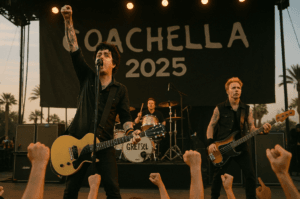Green Day’s Political Coachella Set: 7 Shocking Moments That Rocked the Festival & Ignited Activism
Green Day’s Coachella 2025 set became a defiant anthem for activism as the band transformed their hits into political rallying cries. During their debut performance at the festival, frontman Billie Joe Armstrong altered lyrics to confront contemporary conflicts, swapping “redneck agenda” with “MAGA agenda” in American Idiot and referencing Palestine in Jesus of Suburbia (“runnin’ away from pain like the kids from Palestine”). The crowd erupted in cheers, underscoring the audience’s hunger for art that mirrors global unrest.
Known for decades of anti-establishment punk ethos, Green Day leveraged Coachella’s massive platform to amplify solidarity with marginalized voices, blending nostalgia with urgency. Their set balanced raw protest with fan-centric moments—inviting attendees onstage to sing and play guitar—bridging music and community. By rewriting lyrics mid-performance, the band proved that legacy anthems can evolve to reflect modern struggles, turning a concert into a collective call for justice.
In an era of fragmented discourse, Green Day’s unapologetic stance reminded audiences that music remains a visceral tool for resistance—and that the stage can still ignite change.

Green Day’s Political Coachella Set: 7 Shocking Moments That Rocked the Festival & Ignited Activism
When Green Day took the Coachella stage for the first time in 2025, fans expected the band’s signature rebellious energy. What they got was a masterclass in using music as a megaphone for political dissent. During their Saturday night set, Billie Joe Armstrong and company didn’t just perform hits—they rewrote them, transforming lyrics into urgent commentary on today’s most pressing conflicts. The result? A visceral reminder of music’s power to challenge, provoke, and unite.
A Legacy of Rebellion
Green Day has never shied from politics. From American Idiot’s scathing critique of post-9/11 America to their vocal opposition to the Iraq War, the band has long weaponized punk rock as a tool for dissent. At Coachella, Armstrong doubled down on this legacy. During “American Idiot,” he swapped “redneck agenda” for “MAGA agenda,” a tweak first debuted on New Year’s Rockin’ Eve—a move that already feels timeless in its defiance of divisive rhetoric.
But it was their reimagining of Jesus of Suburbia that ignited the crowd. Altering the line “runnin’ away from pain when you’ve been victimized” to “runnin’ away from pain like the kids from Palestine,” Armstrong directly invoked the Israel-Palestine crisis, drawing roaring applause from the Indio audience.
Why Coachella? Why Now?
Coachella’s global spotlight makes it a strategic stage for activism. With its blend of mainstream appeal and countercultural roots, the festival attracts audiences primed for both celebration and reflection. Green Day’s lyric changes tapped into a growing trend of artists using live performances to address systemic issues—think Beyoncé’s Lemonade visuals or Kendrick Lamar’s incendiary Grammy sets. Yet Green Day’s approach felt raw and immediate, reflecting punk’s DIY ethos. By embedding contemporary struggles into their music mid-performance, they blurred the line between concert and protest, inviting fans to bear witness in real time.
The Crowd’s Roar: More Than Nostalgia
The audience’s thunderous response to the Palestine reference speaks volumes. In an era where social media often dilutes political discourse, collective experiences like live music retain unmatched emotional gravity. For fans, singing along to revised lyrics became an act of solidarity—a momentary fusion of art and activism. This wasn’t just about Green Day’s message; it was about the crowd’s readiness to embrace it. In a post-pandemic world where global conflicts dominate headlines, audiences increasingly crave spaces to channel frustration into something cathartic. Green Day provided that release.
Fan Engagement as a Catalyst
Beyond politics, the band’s connection with their audience shone through. Inviting fan Brooke onstage to crush “Know Your Enemy” and handing a guitar to a (slightly fumble-prone) attendee during “Good Riddance” underscored Green Day’s ethos: music as a communal act. These moments humanized the performance, reminding us that activism isn’t just about grand gestures—it’s about lifting others up to join the chorus.
The Bigger Picture: Art in the Age of Unrest
Green Day’s Coachella set raises broader questions about art’s role in times of crisis. Can a lyric change shift public opinion? Likely not alone. But it can amplify marginalized voices, spark dialogue, and remind listeners that apathy isn’t an option. As Armstrong held the mic aloft, letting cheers for Palestine reverberate, he echoed a tradition of protest music stretching from Woody Guthrie to Childish Gambino—proving that even three chords and a shout can be revolutionary.
Final Notes
Green Day’s Coachella debut wasn’t just a victory lap; it was a call to arms. By refusing to let their anthems fossilize into nostalgia, they’ve shown how music can evolve with the times—and how artists can wield their platforms to reflect, challenge, and inspire. As the festival’s second weekend approaches, one thing is clear: In a fractured world, the stage remains a potent space to demand change, one lyric at a time.
You must be logged in to post a comment.